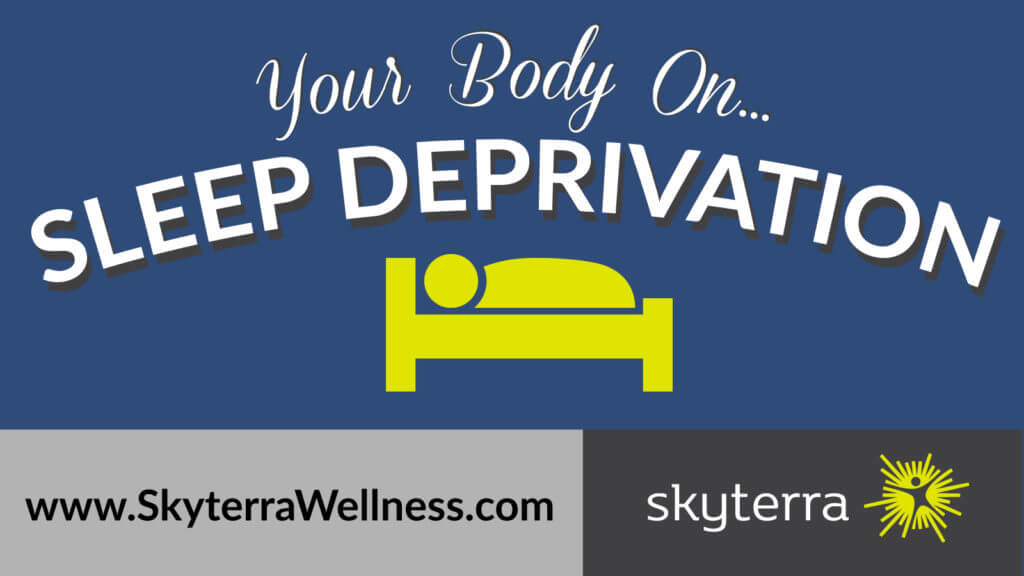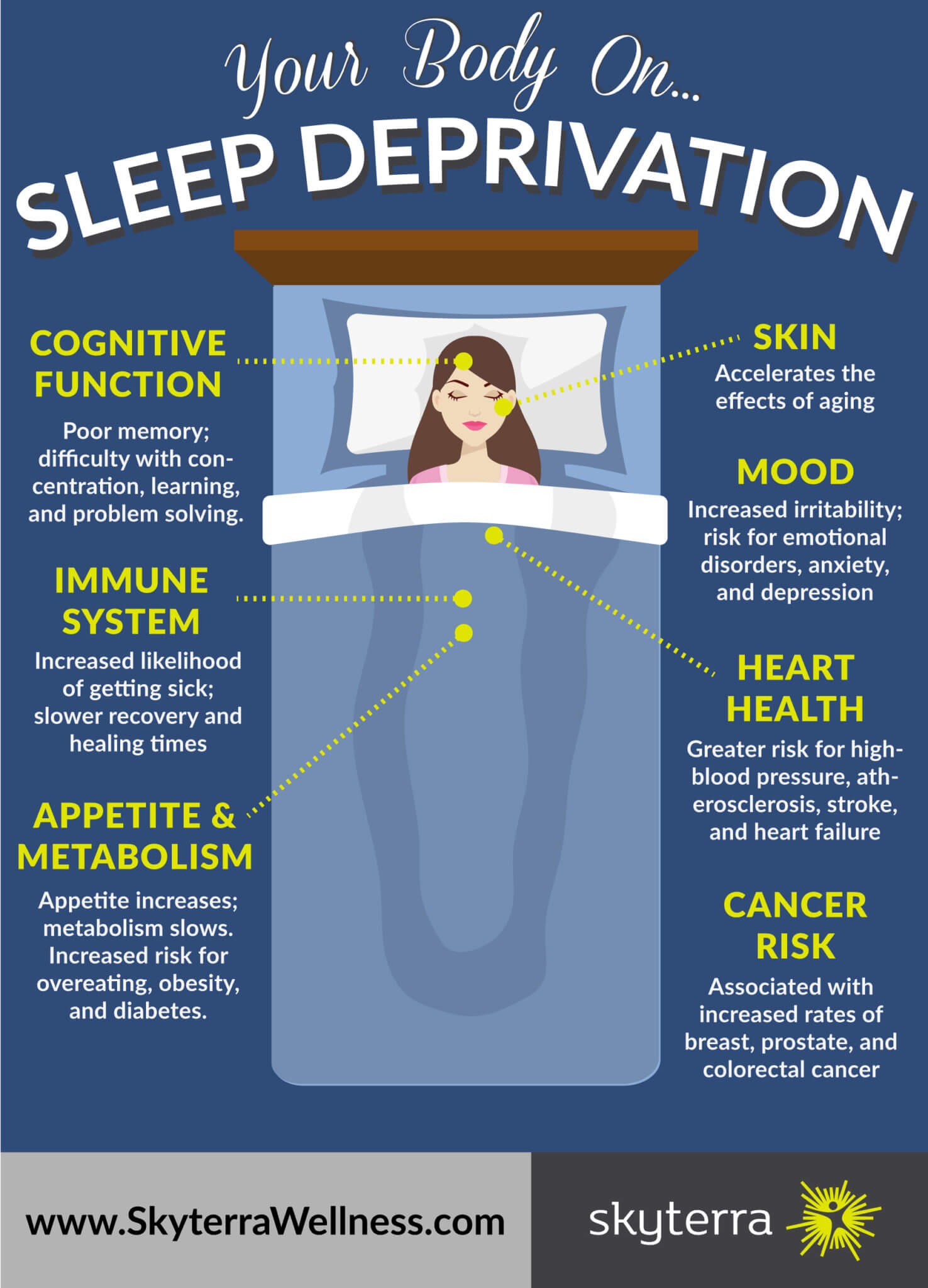What Does Sleep Deprivation Do To Your Body?

It's understandable – once things get busy, sleep is often the first thing to go. Between work, family responsibilities, workouts, chores, social obligations, sometimes there just aren't enough hours in the day. But since sleep deprivation has so many negative effects on your health, it's in your best interest to abandon that "I'll sleep when I'm dead" mentality. Skimping on sleep not only makes it harder to achieve your ongoing wellness goals, it also has long-term ramifications for total-body wellness.
How much sleep do you need?
According to the National Sleep Foundation (NSF), adults should aim for 7-9 hours of sleep per night. Take a close look at your sleep patterns and how you feel: some people feel energetic and productive after seven hours of sleep, but daytime fatigue, caffeine reliance, sleep problems, and other health issues are all signs that you could need more.
Over time, not getting enough sleep can actually make it harder to accomplish everything you need to get done, thanks to the toll it can take on your physical and mental health. Take a moment to learn the effects of sleep deprivation on various systems and functions of the body.

Immune system
It is well-known that sleep deprivation suppresses immune system function. Being chronically underslept increases your likelihood of getting sick and the duration of illness.
The connection between sleep and the immune system is complex. During sleep (among the many other things that happen in your body), your immune system releases proteins called cytokines. Your body needs certain cytokines to battle infections, inflammation, and stress. A lack of sleep causes cytokine levels to drop, which in turn weakens immune function.
Appetite
Sleep helps regulate the hormones that control your appetite. Insufficient sleep can prompt overeating, unchecked hunger, and a lack of satiation.
What’s going on here? Sleeplessness causes leptin levels to drop. Among other things, leptin is an appetite suppressor, so when it is in short supply, your appetite goes unchecked. At the same time, sleep deprivation increases levels of the hormone ghrelin. Ghrelin is an appetite stimulator. So if you’re struggling with your weight or eating habits, skipping out on sleep will likely make things much more difficult.
Metabolism
Similarly, the sleep cycle helps regulate your metabolism. When sleep deprived, the hormones that control your energy expenditure fall out of sync. As a result, your body does not efficiently use your food as fuel.
What does this mean for you? Among other things, studies have shown that sleep deprivation increases the risk of both obesity and diabetes type II.
Cognitive Performance
Struggling with brainpower? A lack of sleep could be to blame. Some of the hallmarks of sleep deprivation are poor memory, difficulty learning, trouble concentrating, and an inability to problem solve.
Skin
They call it “beauty sleep” for a reason. Dark circles and puffy eyes are telltale signs of a rough night. Over the short term, these problems go away once your schedule gets back on track. Over the long term, chronically insufficient sleep exacerbates these problems and accelerates skin aging.
Skin repairs itself during sleep, so insufficient rest means your skin’s function and appearance suffers. “Sleep-deprived women show signs of premature skin aging and a decrease in their skin’s ability to recover after sun exposure,” said one physician-researcher investigating the connection between sleep and skin.
Increased Cancer Risk
Studies have shown lack a chronic lack of sleep is associated with increased rates of breast, prostate, and colorectal cancer. Some researchers believe that the increased inflammation and suppressed immune function associated with sleep deprivation may give rise to cancer development.
Cardiovascular Health
Sleep deprivation can even affect your blood pressure and overall cardiovascular health. Several studies indicate that sleep abnormalities (short nights, shift work, disordered breathing) increase the risk of hypertension, atherosclerosis, stroke, and heart failure.
There are complex biological pathways responsible for this causal link, but there are several factors at play. For one, blood pressure typically falls at night and rises over the course of the day. If the sleep duration falls short, the body can’t undergo this natural reset.
Mood, Anxiety, and Depression
There’s a close link between sleep and mood – if you’ve ever snapped at someone for waking you up, this won’t be a surprise! According to Harvard researchers and other experts, people who don’t get enough sleep are at greater risk for developing emotional disorders, depression, and anxiety.
Even if you don’t develop a full-on mood disorder, it’s no secret that mood swings and negative emotions put a strain on relationships. If you’re trying to get healthier in order to be more present for your loved ones, consider how sleep helps keep you on your best behavior.
If you (or your night owl friends and family members) need more reasons to make sleep a priority, check out this benefits of sleep guide.
We hope these facts encourage you to make sleep a priority! Sometimes it seems like our culture encourages sleeplessness, even praises it, but there is no health replacement for consistent, high-quality sleep. That's why it's an important essential pillar of the Skyterra philosophy. Back to Health. Back to Nature. Back to YOU!